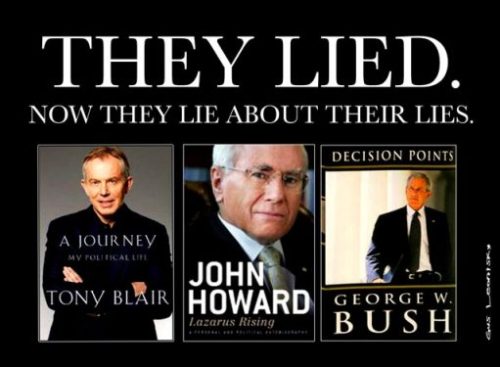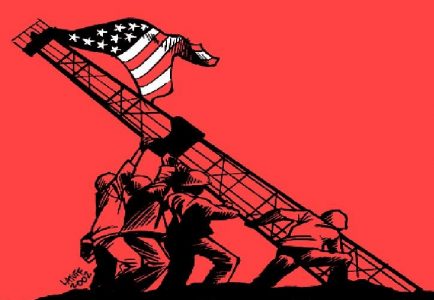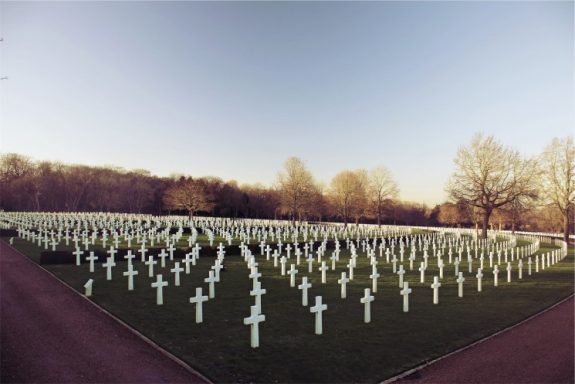Bush, Blair and Howard – Three reckless adventurers in Iraq (Part 1)

The Iraq Inquiry Report (2009-2016) documents how Tony Blair committed Great Britain to war early in 2002, lying to the United Nations, to Parliament, and to the British people, in order to follow George Bush, who had planned an aggression on Iraq well before September 2001.
Australian Prime Minister John Howard conspired with both reckless adventurers, purported ‘to advise’ both buccaneers, sent troops to Iraq before the war started, then lied to Parliament and to the Australian people. He continues to do so.
Should he and his cabal be charged with war crimes? This, and more, is investigated by Dr George Venturini in this outstanding series.
The Iraq Inquiry
On 15 June 2009 the former British Prime Minister, Gordon Brown, announced that an Inquiry would be conducted to identify lessons which could be learned from the Iraq conflict. He said:
“With the last British combat troops about to return home from Iraq, now is the right time to ensure that we have a proper process in place to enable us to learn the lessons of the complex and often controversial events of the last six years. I am today announcing the establishment of an independent Privy Counsellor committee of inquiry which will consider the period from summer 2001, before military operations began in March 2003, and our subsequent involvement in Iraq right up to the end of July this year. The inquiry is essential because it will ensure that, by learning lessons, we strengthen the health of our democracy, our diplomacy and our military.
The inquiry will, I stress, be fully independent of Government. Its scope is unprecedented. It covers an eight-year period, including the run-up to the conflict and the full period of conflict and reconstruction. The committee of inquiry will have access to the fullest range of information, including secret information. In other words, its investigation can range across all papers, all documents and all material. It can ask for any British document to be brought before it, and for any British citizen to appear. No British document and no British witness will be beyond the scope of the inquiry. [As will be seen, this will not be the case] I have asked the members of the committee to ensure that the final report will be able to disclose all but the most sensitive information—that is, all information except that which is essential to our national security.
The inquiry will receive the full co-operation of the Government. It will have access to all Government papers, and the ability to call any witnesses. The objective is to learn the lessons from the events surrounding the conflict.
…..
I believe that that will also ensure that evidence given by serving and former ministers, military officers and officials is as full and candid as possible. The committee will publish its findings in as full a form as possible. These findings will then be debated in the House of Commons and the House of Lords. It is in these debates, as well as from the report itself, that we can draw fully upon the lessons learned in Iraq.” (www.parliament.uk, 15 Jun 2009: Column 23).
…..
“In order that the committee is as objective and non-partisan as possible, the membership of the committee will consist entirely of non-partisan public figures acknowledged to be experts and leaders in their fields. There will be no representatives of political parties from either side of this House. I can announce that the committee of inquiry will be chaired by Sir John Chilcot and it will include Baroness Usha Prashar, Sir Roderick Lyne, Sir Lawrence Freedman and Sir Martin Gilbert. All are, or will become, Privy Counsellors.
The committee will start work as soon as possible after the end of July. Given the complexity of the issues it will address, I am advised that it will take a year. As I have made clear, the primary objective of the committee will be to identify lessons learned. The committee will not set out to apportion blame or consider issues of civil or criminal liability.” (www.parliament.uk, 15 Jun 2009: Column 24).
Opposition parties, campaigners and back bench members of the governing Labour Party condemned the decision to hold the inquiry in secret and its highly restrictive terms of reference which would not, for example, have permitted any blame to be apportioned. In 2015 Sir John Chilcot [hereafter Sir John] was criticised as the Iraq Inquiry remained unpublished after six years. The head of Her Majesty’s Civil Service Sir Jeremy Heywood said that the inquiry had repeatedly turned down offers of extra assistance to help speed up the report. Voices were raised in the House of Lords.
On 22 October 2015, during a debate, Lord Morris of Aberavon, KG PC QC, who had been Blair’s Attorney General between May 1997 and July 1999, complained about the “scandalous delay” in producing the Report.
His Lordship had just asked: “Did the Government believe the claims about Saddam Hussein’s weapons of mass destruction or was the aim regime change, which has no basis whatsoever in international law? Was this the real motivation? Secondly, when was the decision taken to go to war? Was it at Crawford or Camp David, in April 2002?”
He had just deplored that: “… the saddest feature of the inquiry process was the ‘strenuous effort’ of the Cabinet Office to block the committee from having access to ‘swathes of vital documentation,’ including notes from Blair to Bush” adding: “Respect for good governance is undermined if Reports don’t see the light of day before issues become dimmed in public memory.” (www.parliament.uk, 22 Oct 2015: Column 852).
In that complaint His Lordship had been joined by Lord Parekh, who lamented the delay caused by: “the dispute over access to various documents.” He gave an example: “… it took nearly a year to obtain the Blair-Bush correspondence and the notes Mr Blair is supposed to have left with Mr Bush, to read them and to decide whether to include them in the report.” (www.parliament.uk, 22 Oct 2015: Column 858).
Baroness Falkner of Margravine commented: “Looking at the sequencing of events, it is clear that there was some kind of stand-off between the Cabinet Secretary and the Inquiry team, which lasted for a while … it took from July 2012 to January 2015 to reach an agreement on publishing the Blair-Bush correspondence.” (www.parliament.uk, 22 Oct 2015: Column 860).
On the same day, Lord Dykes asked “Why did Tony Blair have those embarrassing exchanges in 2002 [with George W. Bush] when there was no question of there being any declaration of war? Why did the then Government ignore the instinct and feelings of 1.5 million people marching down Piccadilly to protest about what was still an illegal war?”
And he followed on with a barrage of questions such as:
“Why was it so important for [Blair and Bush] to turn on Saddam Hussein if regime change was not the main driver?”
“Why did Tony Blair have those embarrassing exchanges in 2002 when there was no question of there being any declaration of war?”
“Why did the then Government ignore the instinct and feelings of 1.5 million people marching down Piccadilly to protest about what was still an illegal war?”
“Why did the Americans and the British ignore the wise advice of the French Government under President Chirac and Foreign Secretary Dominique de Villepin about the mistake of going to war on that occasion?” (www.parliament.uk, 22 Oct 2015: Column 865).
On 29 October 2015 it was announced that the Report on the Inquiry would be published in June or July 2016.
The Report was published on 6 July 2016, more than seven years after the inquiry was announced.
At the launch, the Chair of the Inquiry, Sir John Chilcot, outlined its scope:
“Our terms of reference are very broad, but the essential points, as set out by the Prime Minister and agreed by the House of Commons, are that this is an Inquiry by a committee of Privy Counsellors. It will consider the period from the summer of 2001 to the end of July 2009, embracing the run-up to the conflict in Iraq, including the way decisions were made and actions taken, to establish, as accurately as possible, what happened and to identify the lessons that can be learned. Those lessons will help ensure that, if we face similar situations in future, the government of the day is best equipped to respond to those situations in the most effective manner in the best interests of the country.”
The Inquiry took oral evidence over a number of months, with as many hearings as possible held in public. The first round began in autumn 2009 and continued into early 2010. After a break for the general election, the Inquiry resumed its hearings from 18 January to 2 February 2011, with private hearings concluding by the end of May 2011. Written evidence studied by the Inquiry included over 150,000 contemporaneous documents.
The Gargantuan final work, The Report of the Iraq Inquiry, is contained into twelve volumes, for a total of 6,275 pages, totally some 2.6 million words. The customary executive summary runs for 150 pages.
The Report is by far longer than Thucydides’ History of the Peloponnesian war, which only required eight books, and would be by far more than five times longer than Leo Tolstoy’s War and peace, at 587,287 words, and the entire works of William Shakespeare, at 884,421 words.
The Report is on sale for 767.00 English pounds. Between 2009 and 2016 the Inquiry required the expenditure of 10,374.600 pounds, or AU$ 17,376.400.
The members of the Inquiry Committee were: Sir Lawrence Freedman, KCMG, CBE, FBA, a distinguished historian, Emeritus Professor of War Studies at King’s College, London; Sir Roderic Lyne, KCMG, a former British diplomat who served as British Ambassador to the Russian Federation from 2000 to 2004; the Right Honourable Usha Kumari Prashar, Baroness Prashar, CBE, who had served as a director or chairman of a variety of public and private sector organisations, and had been appointed as chairman of the Judicial Appointments Commission in 2005; and another distinguished historian and author, Sir Martin Gilbert, CBE, FRSL, honorary fellow of Merton College, University of Oxford.
They had all been made members of the Privy Council of the United Kingdom to facilitate access to the classified information related to the Iraq war. The word ‘Privy’ actually means ‘private’ or ‘secret’. A privy council was originally a committee of the monarch’s closest advisors to give confidential, secret advice on state affairs. In the United Kingdom Her Majesty’s Most Honourable Privy Council, which is the actual and full name, is a formal body of advisers to the Sovereign.
So, how transparent has the Inquiry been?
As already noted, Prime Minister Gordon Brown had initially announced an inquiry which would sit entirely in secret but soon changed his mind after significant public and political opposition, and the majority of hearings have been held in public. However the Inquiry has been criticised for agreeing to let the government determine which documents it was allowed to publish and this issue has by its own admission hampered its work, including restricting questioning during witness sessions.
The Inquiry could be judged not only on how much of what it learned it would make public but on how much it was prepared to reveal about its own workings and methods. On this point, it has often failed to live up to its promise of openness.
The Inquiry has been widely criticised for not publishing en masse the documents given to it by the government. It indicated from the outset that it intended to publish “the key evidence” with its report at the end of the process. It also said that “It is the Committee’s intention to publish all the relevant evidence except where national security considerations prevent that.” In addition, “It may also publish material on the website as the Inquiry progresses where this will help increase public understanding of its ongoing work.”
The protocol ‘agreed’ with the government for the disclosure and possible publication of evidence has been widely criticised, including being raised in the House of Commons at Prime Minister’s Questions. The protocol required the Inquiry to seek permission not just to publish documents but to refer to them at any point in its proceedings.
In a statement on 17 December 2009, Sir John defended the Inquiry’s approach. He said that the Committee had taken “a conscious decision” not to publish “a mass of documentary material” but that it would “increasingly wish to draw on government records which are currently classified – in some cases highly classified – in its questioning. Where we do, we will seek the necessary declassification of records in advance of the relevant public hearings, with a view to making the written records publicly available.”
Since the second phase of the public hearings, the Inquiry published documents alongside witness sessions. It is also clear that the government was able to manipulate the process in that, for example, the Inquiry has published a diplomatic telegramme containing the official line to take on the critical April 2002 Crawford, Texas meeting but not the full record of that meeting.
In a letter to Prime Minister David Cameron in July 2012, Sir John stated that it would not “publish further information piecemeal and in advance of its report.”
The majority of hearings have taken place in public but there have been a number of secret evidence sessions, that the Inquiry described as “private”. In some case it has published redacted transcripts of those sessions.
Sir John also said that “if the Inquiry is to succeed in getting to the heart of what happened and what lessons need to be learned for the future, we recognise that some evidence sessions will need to be private. Sometimes that will be consistent with the need to protect national security, sometimes to ensure complete candour and openness from witnesses.”
It was thought that the intention that secret sessions might be held to ensure complete candour could raise the possibility that they might be used to meet the needs of witnesses to avoid embarrassment; on the other hand, that might be necessary to protect whistleblowers.
Tomorrow: The Iraq Inquiry (continued)
➡️ Part 2
 Dr. Venturino Giorgio Venturini – ‘George’ devoted some sixty years to study, practice, teach, write and administer law at different places in four continents. In 1975, invited by Attorney-General Lionel Keith Murphy, Q.C., he left a law chair in Chicago to join the Trade Practices Commission in Canberra – to serve the Whitlam Government. In time he witnessed the administration of a law of prohibition as a law of abuse, and documented it in Malpractice, antitrust as an Australian poshlost (Sydney 1980).
Dr. Venturino Giorgio Venturini – ‘George’ devoted some sixty years to study, practice, teach, write and administer law at different places in four continents. In 1975, invited by Attorney-General Lionel Keith Murphy, Q.C., he left a law chair in Chicago to join the Trade Practices Commission in Canberra – to serve the Whitlam Government. In time he witnessed the administration of a law of prohibition as a law of abuse, and documented it in Malpractice, antitrust as an Australian poshlost (Sydney 1980).
Like what we do at The AIMN?
You’ll like it even more knowing that your donation will help us to keep up the good fight.
Chuck in a few bucks and see just how far it goes!
Your contribution to help with the running costs of this site will be gratefully accepted.
You can donate through PayPal or credit card via the button below, or donate via bank transfer: BSB: 062500; A/c no: 10495969











